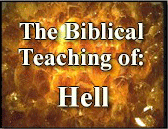

Page 5
By Ernest L. Martin, Ph. D., 1978
Edited by David Sielaff, June 2003
© 1976-2018 Associates for Scriptural Knowledge
Conclusion
It is true that God has used fire as a judgment in the past. He will also do so in the future. There is the lake of fire (Revelation 20:10), the fires of the symbolic Gehenna (Matthew 23:33), and the fires which will finally melt the elements of the earth (2 Peter 3:10–12), but when these fiery judgments are over, there will be a new heavens and new earth. "We, according to his promise, look for new heavens and a new earth, wherein dwells righteousness" (verse 13). All the judgments of fire are intermediate. They play a part in preparing the earth and the universe for the perfect creation in which no more punishments will be necessary.
The major point that one should remember is the biblical teaching that the penalty for sins is not to be placed in hell fire to be tormented forever. If so, then Christ would have to be there for all eternity paying for our sins. But Christ "once suffered for sins ... being put to death in the flesh" (1 Peter 3:18). Likewise, the consequence of sins is not eternal death, or Christ would now have to be eternally dead in paying for our sins. The punishment of all sins is death (Romans 6:23) and that is exactly what Christ did for us. He died to save you, to save the whole world (1 Timothy 2:4–6), and finally He will save the entirety of the universe (Ephesians. 1:10; Colossians 1:15–20).
And while it is possible for God to destroy both body and soul (Matthew 10:26) — and all of man’s bad works will be destroyed — God wills that no one will perish forever (2 Peter 3:9). "If any man’s work shall be burned, he shall suffer loss: but he himself shall be saved; yet so as by fire" (1 Corinthians 3:15).
The intermediate fires of judgment will one day come to an end when they have accomplished their tasks. This will occur when,
"at the name of Jesus every knee should bow, of things in heaven, and things in earth, and things under the earth; and that every tongue should confess that Jesus Christ is Lord, to the glory of God the Father."
• Philippians 2:10–11
Ernest L. Martin, 1978, 1981
Edited by David Sielaff, June 2003